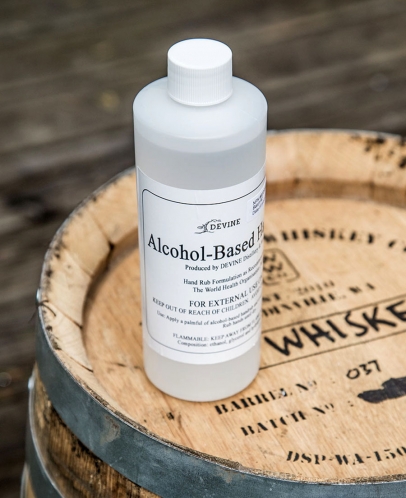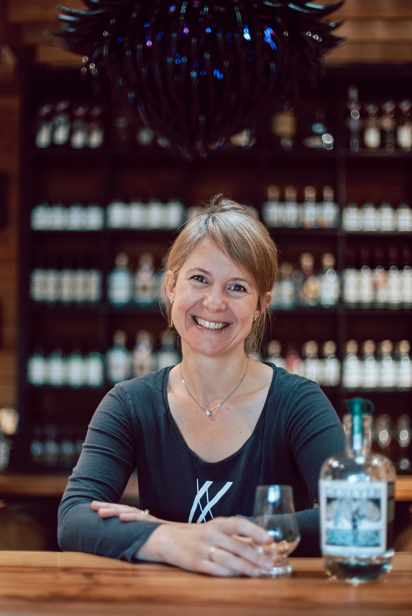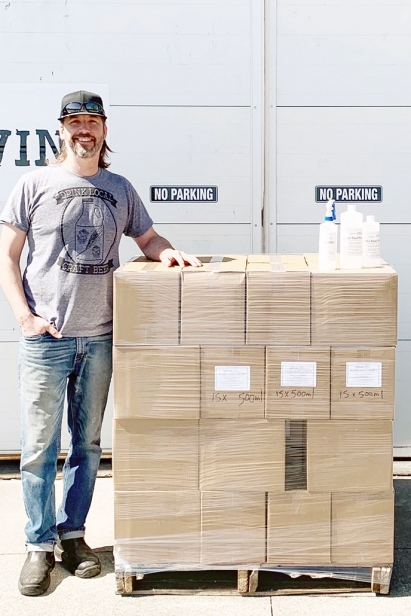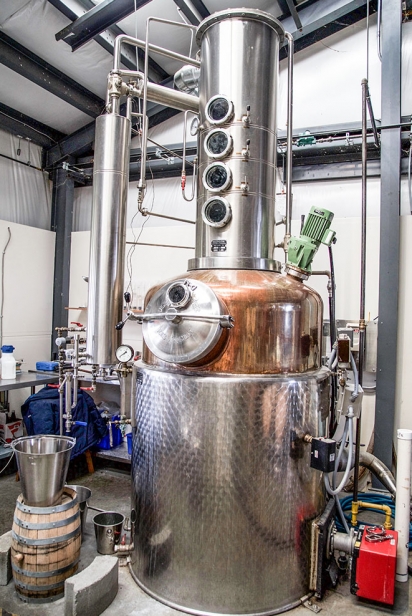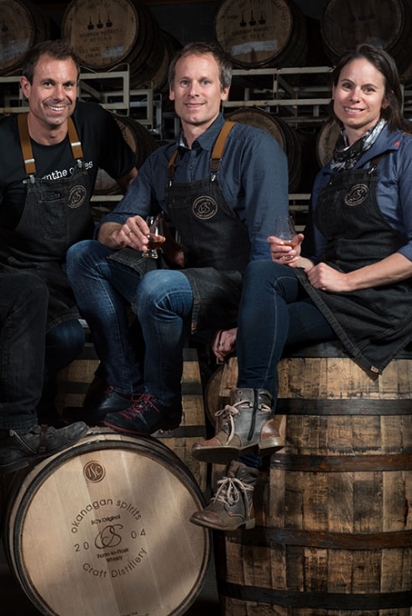From Spirits to Sanitizer
When you imagine a dram of golden whisky, do you think of a luxurious indulgence or social action? If it’s an indulgence, that’s about to change. Since the onset of the COVID-19 crisis, craft distillers across British Columbia have been using their expertise to produce a different kind of liquid gold: hand sanitizer.
“We’re all doing this for the same reasons,” says Tyler Dyck, president of the Craft Distiller’s Guild of British Columbia. “We targeted frontline medical and essential services for sanitizer donations because they’re the ones caring for all of us. If we can protect them, ultimately we’re protecting everyone.”
This about-face from sips to sanitizer has been nothing less than heroic, involving all-nighters, emergency lines of credit and frantic searches for supplies. Dyck has been co-ordinating the effort through the guild since mid-March. And he’s done it all while also shepherding his own family business, Okanagan Spirits craft distillery, through the sanitizer production process. They have donated 38,000 bottles to date.
“The provincial government reached out to us in response to the shortage. They wanted to know how many distillers the guild could encourage to make sanitizer.”
Dyck liaised with various government departments at all levels in an effort to provide resources for guild members, covering the mind-boggling details of Health Canada requirements and World Health Organization recommendations to labelling protocol.
“It’s been like starting a whole new business,” says Gordon Glanz of Odd Society Distillery in East Vancouver. He doesn’t recall the exact moment they decided to make sanitizer because it’s been such a whirlwind, but he does remember being overwhelmed by the regulatory side. Since distilleries already navigate so many regulations, that just goes to show the intensity of the learning curve.
Like all distillers large and small, Odd Society has the equipment and expertise to create alcohol for sanitizer base, which makes these producers unique. “We realized we were in the position to do this. We’re grateful we have something to contribute. But the resources from the guild made it manageable,” Glanz says.
“The first few weeks were really stressful. There are so many layers of licensing,” says Kirsten Titcomb of DEVINE Distillery and Winery in Victoria. “The community response from B.C. craft distillers has been amazing. Everybody is sharing strategies and tips. We couldn’t have done this if we weren’t in it together.”
But manageable isn’t the same as easy. For one thing, producing hand sanitizer the artisanal way is basically the most expensive, least efficient method possible. Everything is done by hand, from scratch, with top-quality local farm-sourced ingredients.
Worse, the COVID crisis hit at the hardest time of the fiscal year for distillers, when their income is nil. To complicate matters, many were paying core staff to self-isolate at home.
“We’re all in the same position,” Dyck explains. “We lose money every month from January until cash flow starts again with the summer season in May. We hope to cover our costs by Fall. Then we’ve got until the end of the year to set ourselves up for surviving next year.” These small businesses run on razorthin margins; it’s very difficult to make a profit.
Members of the guild purchase all their ingredients locally. Every single grain and piece of fruit for their craft spirits comes from B.C. farmers. They’re an important link in the chain and never more so than now.
Despite their dire situations, the distillers have been bankrolling sanitizer production primarily themselves — with some cash donations from the community and product donations such as bottles or labels from other kind-hearted local small businesses. It costs $20 to $30 to make each litre. Most were giving it away through the first month, but some have had to start charging for a percentage just to stay afloat.
“Considering that the alcohol used to make sanitizer would have aged into a lovely whisky, we’re actually talking about an ultimate loss of $40 to $70 per bottle,” Dyck points out.
The distillers are burning through ingredients they’ve stockpiled for their spirits production, using precious — even organic — local grain and fruit to make alcohol base. They have no idea how they’ll replace it. “We used 3,900 litres of our wine to make sanitizer,” Titcomb says.
“We only bottled 250 cases for the coming season — the smallest run in our history. But it’s the best-smelling hand sanitizer ever. We call it the winetizer.”
She hopes they’re able to keep going. “We’re committed, and we’ve promised to donate as much as we can to local frontline workers through the Vancouver Island Health Authority.” But they’re walking a tightrope with no idea what will happen to the market. “We hope to survive this.”
For Odd Society, it was a small miracle they even had enough stock on hand to make their first batch of sanitizer. “We realized we had some gin scrap runnings and then we dipped into the spirits we had stockpiled to do a month of whisky production — we never have that on hand.” But when the larders were bare, they thought they were done. “We just couldn’t source any more materials for the base. We even tried mashing sugar, which we’ve never done before,” Glanz explains. “My wife was frantically writing emails trying to find supplies.”
Finally, a large corporate donor, who chooses to remain anonymous, responded to her pleas, eager to sponsor their efforts to keep frontline workers safe in Vancouver’s Downtown East Side. “Suddenly, it hit home,” Glanz says. “I realized — ‘Wow, this is really happening, we are going to have a lot of hand sanitizer'” With the at-cost neutral grain spirit from this corporation they can keep going.
“We hope the provincial government will step up to cover at least production costs for the sanitizer we collectively donated to B.C.’s frontline heroes,” Dyck says. “But at this point, we’ll keep going because it’s the right thing to do — even if it ends up costing us dearly.”
But that’s just the financial side. There are also production considerations.
“Initially we didn’t think our vintage pot still, ‘Brunhilde,’ could handle it,” Titcomb says. “She wasn’t built for this kind of work.” Her husband Kevin, DEVINE’s distiller, worried it was impossible to achieve the necessary strength of alcohol for sanitizer base, meeting the WHO formula, but he kept tinkering until he got it. Then the real work began.
“When we made the decision to pivot to sanitizer, we had multiple products at various stages of production. We spent the first couple of weeks wrapping up regular activities while navigating the sanitizer licensing and then making the first batch. Now our production is solely sanitizer.”
Odd Society also has to juggle ongoing production. “Our barrel program came due right in the middle of this,” Glanz explains of the customer-funded approach that functions similarly to Community Supported Agriculture. “We had to run that program — it’s a commitment to the customers who help make this whole thing happen. They paid for their whisky three years ago.”
While their heads spin with logistics, the distillers say such a switch on the fly isn’t new for them. “It’s a big pivot, but honestly, we’ve been pivoting since day one,” Glanz says. “We adapt as the regulations change and as opportunities arise. That’s how we opened our lounge.” Now that they’ve found solid ground with this new direction, Odd Society has committed to donating a quarter of their sanitizer production while selling three quarters to keep the lights on.
And it’s worth it, they all confirm. As challenging as it’s been, they take pride in doing the right thing and doing it by the books. “
Nothing feels as good as all the emails from people thanking us for keeping them safe. Every day we hear from so many people telling us the impact on their family and how it’s restored their belief in community,” Dyck says. “This is a scary time, but also the most heart-warming that any of the distillers have experienced. This isn’t just sanitizer. It’s so much bigger than that.”
DEVINE Distillery & Winery
6181B Old West Saanich Road, Victoria, B.C.
devinevineyards.ca | 250.665.6983 | @devinedistilleryandvineyards
Craft Distiller’s Guild of British Columbia
craftdistillers.ca | @craftdistillersbc
Odd Society Spirits
1725 Powell Street, Vancouver, B.C.
oddsocietyspirits.com | 604.559.6745 | @oddsocietyspirits
Okanagan Spirits Craft Distillery
5204 24 St., Vernon, B.C.
okanaganspirits.com | 1.888.292.5270 | @okanaganspirits


